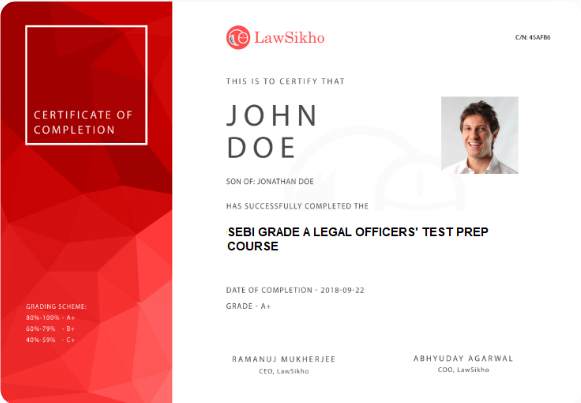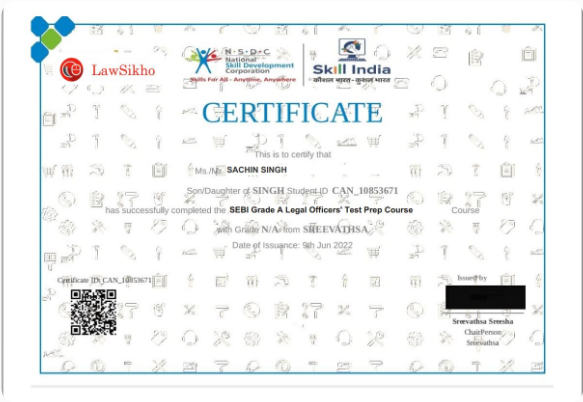Lesson 1: Important concepts in Companies Act, 2013
Lesson 2: How to incorporate a private limited company
Lesson 3: How to incorporate a public limited company
Lesson 4: How to draft Memorandum of Association
Lesson 5: How to draft Articles of Association
Lesson 6: How to alter Memorandum of Association
Topic-wise assignments for this module- 100 MCQs (indicative)
Lesson 1: Offer documents
Lesson 2: Advertisement of prospectus
Lesson 3: Liability for Mis-statements in prospectus
Lesson 4: Private placement of securities
Topic-wise assignments for this module- 100 MCQs (indicative)
Lesson 1: Types of Securities
Lesson 2: Transfer of Shares
Lesson 3: Rights Issues
Lesson 4: Bonus Issues
Lesson 5: Reduction of Capital
Lesson 6: Debentures
Lesson 7: Why do companies buy back their shares
Topic-wise assignments for this module- 125 MCQs (indicative)
Lesson 1: Acceptance of Deposits by Companies
Lesson 2: Compliances in relation to registration of charges
Lesson 3: Register and records of the company
Lesson 4: Shareholder meetings: Legal and governance aspects
Lesson 5: Dividends
Topic-wise assignments for this module- 100 MCQs (indicative)
Lesson 1: Accounting and the law
Lesson 2: Approval of financial statements of listed companies
Lesson 3: Auditors: Appointment, role and removal under the Companies Act, 2013
Topic-wise assignments for this module- 75 MCQs (indicative)
Lesson 1: Appointment of Directors
Lesson 2: Different types of Directors
Lesson 3: Independent Directors
Lesson 4: Liabilities of Directors
Topic-wise assignments for this module- 100 MCQs (indicative)
Lesson 1: Board meeting and best practice aspects
Lesson 2: Convening of meetings through video conferencing
Lesson 3: Related party transactions
Video: When and why do companies need to enter into related party transactions
Video: Who qualifies as related party
Lesson 4: Inter corporate transactions
Lesson 5: How can Audit committees act as a safeguard
Lesson 6: Nomination and remuneration committee
Topic-wise assignments for this module- 100 MCQs (indicative)
Lesson 1: Roles and responsibilities of a Managing Director
Lesson 2: CEO, COO, CFO: Roles and responsibilities
Lesson 3: Managerial Remuneration
Note: Secretarial Audit
Video: Regulation of severance compensation for directors
Topic-wise assignments for this module- 25 MCQs (indicative)
Lesson 1: How to obtain dispensation from conducting meetings of members and creditors
Lesson 2: How to draft a petition for approval of a scheme of arrangement
Lesson 3: Fast track mergers in India
Topic-wise assignments for this module- 50 MCQs (indicative)
Lesson 1: When and how can you file a petition against oppression and mismanagement
Lesson 2: A primer on matters which can be dealt with by NCLT
Lesson 3: Special courts under the Companies Act, 2013
Lesson 4: Fraud and other offences under the Companies Act, 2013
Lesson 5: Dormant companies under the Companies Act 2013
Topic-wise assignments for this module- 200 MCQs (indicative)
Lesson 1: Basics of Limited Liability Partnerships
Lesson 2: Steps for incorporation of an LLP
Lesson 3: Annual and periodic compliance for LLPs
Lesson 4: Comparison between an LLP and a Company
Topic-wise assignments for this module- 50-100 MCQs (indicative)
Lesson 1: Introduction to IBC and its purpose
Lesson 2: Glossary of terms and explanation of key concepts in IBC
Lesson 3: Overview of corporate insolvency resolution process
Lesson 4: Role of National Company Law Tribunal (NCLT) in approval / rejection of resolution plan
Lesson 5: Liquidation process under IBC
Topic-wise assignments for this module- 100 MCQs (indicative)






























 COMPANY LAW
COMPANY LAW 
